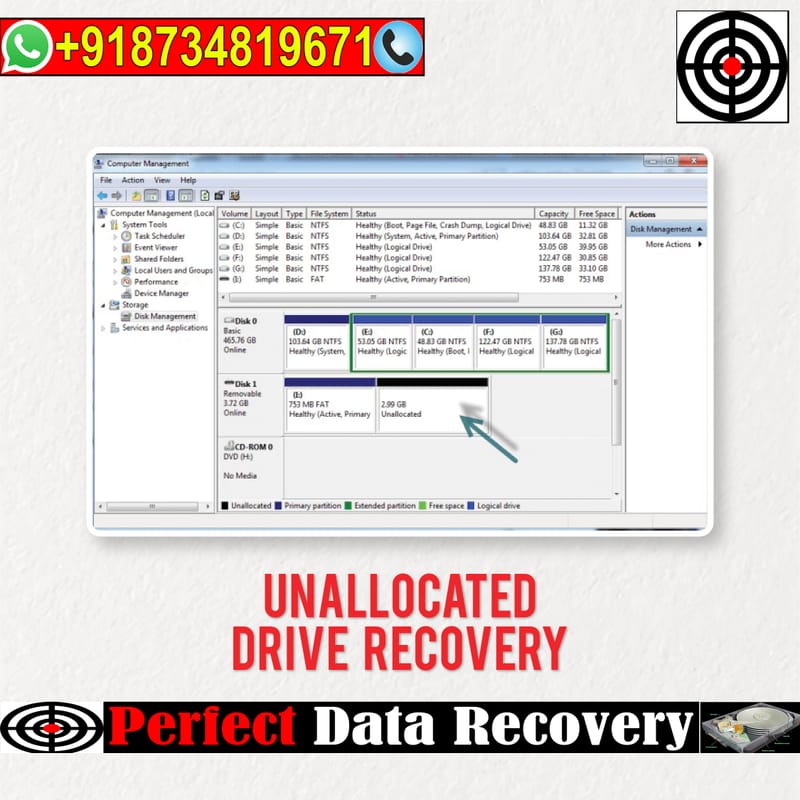
Reclaiming Lost Data: A Guide to Restoring Your Unallocated Drive Recovery
In today’s digital age, data is invaluable. Losing access to your data due to a hard drive turning "unallocated" can be a stressful experience. In this guide, we will explore what unallocated drive recovery involves, and how services like those offered by Perfect Data Recovery can help you retrieve your lost data efficiently.
What is an Unallocated Drive?
An unallocated drive refers to a portion of a hard disk that the computer's operating system does not recognize. This usually occurs after the deletion of partitions, a system crash, or disk management errors. When a drive is unallocated, it means the data exists but the pathway to access this data has been lost, rendering the data invisible to the system.
Causes of Drive Unallocation
Several factors can lead to a drive becoming unallocated:
Partition Deletion: Accidentally deleting a partition during disk management or while installing a new operating system.
Virus Attack: Malicious software can corrupt or delete partitions, making them unallocated.
Improper System Shutdowns: Frequent power failures or improper shutdowns can lead to file system errors that may render a disk unallocated.
Disk Management Errors: Errors within the disk management utility can sometimes delete partitions without user intention.
Unallocated Hard Disk Recovery Techniques
Recovering an unallocated hard disk involves several technical steps that can be complex. Here’s a simplified overview:
Software Recovery Tools: The use of specialized data recovery software is the most common method for unallocated drive recovery. These tools scan the unallocated space to find and reconstruct lost partitions and make them recognizable to the system again.
Professional Data Recovery Services: For complex recovery tasks, professional data recovery services are recommended. Experts can handle various scenarios with the necessary tools and environments to ensure the highest data recovery success rate.
Step-by-Step Guide to Unallocated Drive Recovery
Recovering data from an unallocated space can be daunting, but by following these steps, you can attempt to recover your data:
Do Not Overwrite: Avoid using the disk to prevent new data from overwriting the existing data in the unallocated space.
Use Recovery Software: Use a reliable data recovery tool. These tools generally offer a wizard that guides you through the recovery process, making it user-friendly even for non-tech-savvy individuals.
Scan the Unallocated Space: Allow the software to perform a thorough scan. This can be time-consuming depending on the size of the drive.
Preview and Recover: Post-scan, preview the recoverable files, select the needed ones, and save them to a different drive.
Choosing the Right Service for Unallocated Hard Disk Recovery
Selecting an appropriate recovery service is important. Here are a few tips:
Expertise and Experience: Look for services with extensive experience in unallocated hard disk recovery.
Security Practices: Ensure that the service follows strict data security protocols to protect your data during the recovery process.
Success Rate: Check the service provider’s success rate with similar recovery operations.
Customer Reviews: Read testimonials and customer reviews to understand the reliability of the service.
Conclusion
Unallocated drive recovery can be a lifeline in retrieving important data that seems lost. With the right tools and expertise, it is possible to recover data from an unallocated space. Services like the ones offered by Perfect Data Recovery specialize in such recovery processes, offering a blend of expertise and secure recovery solutions.
Losing data to an unallocated drive doesn't have to be permanent. By understanding the causes, using the right recovery methods, and choosing competent recovery services, you can achieve a successful restoration of your valuable data.
Frequently Asked Questions
1. What is unallocated drive recovery?
Unallocated drive recovery is the process of retrieving data from hard drive spaces that the system does not recognize. This usually happens after partitions are deleted or corrupted.
2. How does a hard disk become unallocated?
A hard disk can become unallocated due to several reasons, including accidental deletion of partitions, virus attacks, disk management errors, or improper system shutdowns.
3. Can data from an unallocated hard disk be recovered?
Yes, data from an unallocated hard disk can often be recovered using specialized software or through professional data recovery services like those offered by Perfect Data Recovery.
4. What should I do first if my drive becomes unallocated?
If your drive becomes unallocated, stop using the disk immediately to avoid overwriting data. Use a reliable recovery tool or contact a professional recovery service to attempt data recovery.
5. How successful is unallocated hard disk recovery?
The success of unallocated hard disk recovery depends on factors such as the extent of disk damage and whether any new data has been written to the disk. Using professional services can significantly increase the chances of successful recovery.